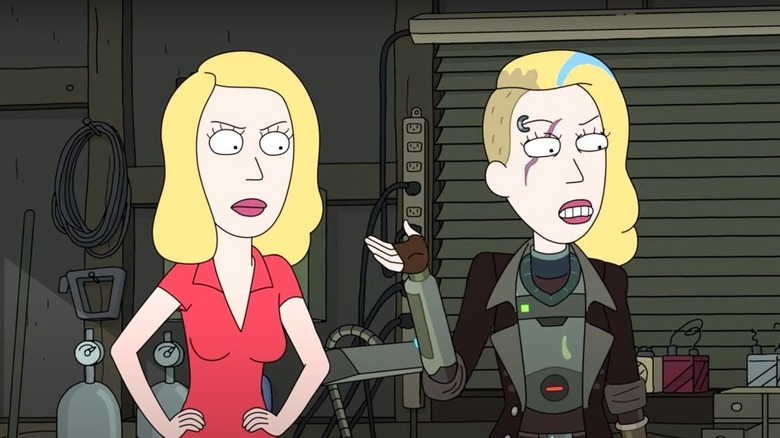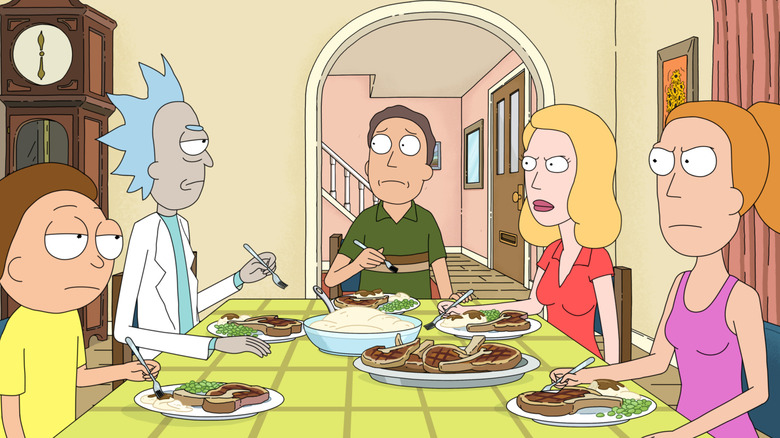One of the best parts of "Rick and Morty" is its episodic structure. With a few rare exceptions, every episode tells a complete standalone story. And as the season 6 premiere reminded us, no event is so apocalyptic that it can stop the Smith family from being together under the same roof at the start of the next episode. If one of them dies, that's okay; they'll simply get another version of the character from another reality to take their place.
The status quo rarely changes in "Rick and Morty," which makes it so you can watch any episode at random and still mostly understand things. One downside, however, is that this can frustrate the more passionate fans. A character like Evil Morty was introduced in season 1, brought back for one episode in season 3, then mostly ignored throughout seasons 4 and 5. It was only in the season 5 finale that the show answered fans' questions about the character once and for all.
But as showrunner Dan Harmon explained, this is just an unavoidable part of what the show is: "Every season there's going to be some larger canonical stuff in a certain number of episodes, and then a lot of just fun evergreen [stuff]." He described season 5 as being "60, 70 percent pretty evergreen episodic," or what a particularly annoying type of fan might call filler. But as the show gets older, a higher percentage of episodes might require some previous knowledge to understand.
Letting Younger Writers Take Over

"The more history a show has, the more world-building and crazy events and stuff there are," Harmon said, describing "Rick and Morty" as "a show that has consequences and calls things back, and it doesn't just do a full blind reset every time the credits roll."
There's also the fact that Harmon, who loves the more episodic approach, is taking more of a backseat as the show goes on. "I'm letting younger writers who are fans of the show … if they tell me, 'We need to address evil Morty,' I believe them," Harmon explained. "I don't want to be 49 years old and hitting millennials with my cane in the writer's room and demanding that we do an episode about a talking yo-yo."
It's perhaps this change in attitude that's led to the season 6 premiere feeling so different from the previous two premieres. Season 4 and 5 opened with an episode that could mostly be described as evergreen. Besides Jessica turning into a time god, nothing happened in either of those that affect the rest of the series or would require much previous knowledge to understand. "Solaricks," meanwhile, is an episode that's barely comprehensible if you haven't at least watched season 1's "Rick Potion #9," season 2's "Mortynight Run," a lot of season 3, and the seasons 4 and 5 finales. It comes at a cost of not being as accessible to any first-time viewers, but it's also had the benefit of giving us what seems widely agreed to be an incredibly strong start to the new season.
Making A Show That Can Go On For A Long Time

"Rick and Morty" is a show that's currently on track to go on for ten seasons, and most likely several more after that. It's also a genre-savvy show, one that's hyper-aware that by season 6, most shows' best days are already behind it. This might be why it's been so hesitant to embrace serialization. The more you change the status quo and the more major revelations you include, the closer you get to the feeling that the main story of the show's already been told.
The other benefit is that this balancing act helps to mold audience expectations. When the show takes its sweet time getting around to an Evil Morty follow-up story, it's making it clear that Evil Morty isn't really that important in the grand scheme of things. "Rick and Morty" is about Rick going on adventures with Morty and the rest of the family; the stuff with Evil Morty or Space Beth or Birdperson is just one of many things the show's about. It's by avoiding making these things a core of "Rick and Morty" that the show's allowed itself to go on for so long without running out of steam.
"We've certainly got elements that can only happen once as far as revelations about Rick and stuff like that," Harmon explained, "but I do believe that the adventures can go on for theoretically 1000 episodes." Although a hundred seasons of "Rick and Morty" seems a little excessive, this show does seem to have strong enough legs to last a while. Fans may currently be speculating about the new Evil Rick, but we know now that regardless of how the storyline with Evil Rick turns out, the show can still go on.
Read this next: The 15 Best Rick And Morty Villains Ranked
The post Telling Serialized Stories On Rick And Morty Is A Delicate Balancing Act appeared first on /Film.

